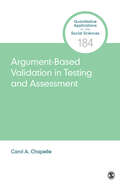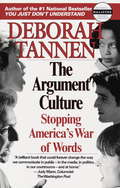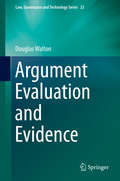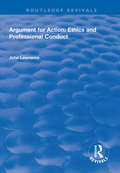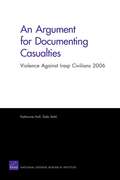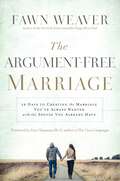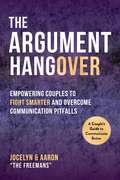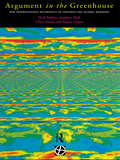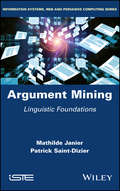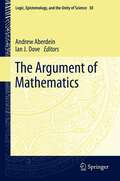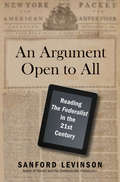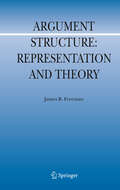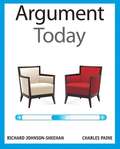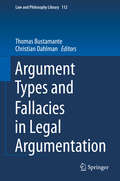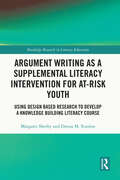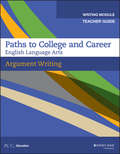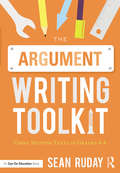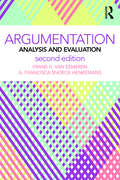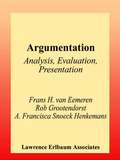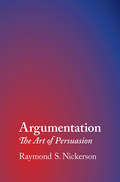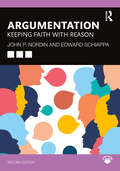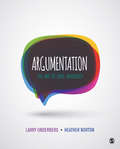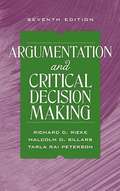- Table View
- List View
Argument-Based Validation in Testing and Assessment (Quantitative Applications in the Social Sciences #184)
by Carol A. ChapelleCarol A. Chapelle shows readers how to design validation research for tests of human capacities and performance. Any test that is used to make decisions about people or programs should have undergone extensive research to demonstrate that the scores are actually appropriate for their intended purpose. Argument-Based Validation in Testing and Assessment is intended to help close the gap between theory and practice, by introducing, explaining, and demonstrating how test developers can formulate the overall design for their validation research from an argument-based perspective.
Argument-Based Validation in Testing and Assessment (Quantitative Applications in the Social Sciences #184)
by Carol A. ChapelleCarol A. Chapelle shows readers how to design validation research for tests of human capacities and performance. Any test that is used to make decisions about people or programs should have undergone extensive research to demonstrate that the scores are actually appropriate for their intended purpose. Argument-Based Validation in Testing and Assessment is intended to help close the gap between theory and practice, by introducing, explaining, and demonstrating how test developers can formulate the overall design for their validation research from an argument-based perspective.
The Argument Culture
by Deborah TannenDeborah Tannin is perhaps most famous for her descriptions in the differences in how men and women use language and interact with each other in the workplace. In this, her newest book, Ms. Tannin turns her keen linguistic eye -- and ear -- on "the Argument culture". Her contention is that modern American culture tends to promote argument for argument's sake, that we're often too busy yelling at each other to listen to each other. Using examples as diverse as Whitewater and Greek culture, she contends that both sides can, in fact, be right, and that there are, in fact, usually more than two sides to an argument. This book is a must read and should be required reading for all politicians, lawyers -- for everyone.
Argument Evaluation and Evidence (Law, Governance and Technology Series #23)
by Douglas WaltonThis monograph poses a series of key problems of evidential reasoning and argumentation. It then offers solutions achieved by applying recently developed computational models of argumentation made available in artificial intelligence. Each problem is posed in such a way that the solution is easily understood. The book progresses from confronting these problems and offering solutions to them, building a useful general method for evaluating arguments along the way. It provides a hands-on survey explaining to the reader how to use current argumentation methods and concepts that are increasingly being implemented in more precise ways for the application of software tools in computational argumentation systems. It shows how the use of these tools and methods requires a new approach to the concepts of knowledge and explanation suitable for diverse settings, such as issues of public safety and health, debate, legal argumentation, forensic evidence, science education, and the use of expert opinion evidence in personal and public deliberations.
Argument for Action: Ethics and Professional Conduct (Routledge Revivals)
by John LawrenceFirst published in 1999. This book will help professions and professionals to identify their contribution to society and to understand the argument in which they must engage if they are to justify their conduct. Because of their specialized expertise and power, the task is both difficult and pressing. The work is divided into two parts. Part 1 discusses the concepts ‘ethics’ and ‘professional conduct’, indicating their dimensions and contested nature. In each case, following examination and analysis of relevant literature, a conceptual framework or model is proposed for locating instances of, in turn, ethics and professional conduct. In part 2, the model of ethical choice is used to discuss the ethical justification of professional conduct in the various forms, locations, and stages provided by its social setting. In this way, it provides grounding arguments for relevant action by professionals and others dealing with professionals. The book concludes with a proposal for a national standing commission on the professions.
An Argument for Documenting Casualties
by Dale Stahl Katharine HallThis study examines available open-source data on Iraqi civilian fatalities and assesses problems associated with previous collection efforts. The authors present a new and more robust RAND Corporation Iraqi civilian violence dataset from which they derive observations about trends in targeting and weapons in 2006. These findings lead to a proposed framework for future civilian fatality data-collection efforts in Iraq and beyond.
The Argument-Free Marriage: 28 Days to Creating the Marriage You've Always Wanted with the Spouse You Already Have
by Gary Chapman Fawn WeaverIs an argument-free marriage possible? Fawn Weaver's answer is yes, absolutely, even when one or both partners are strong willed, independent, and opinionated. (She admits to being all three.) In this groundbreaking book, the best-selling author and award-winning marriage blogger asks readers to invest twenty-eight days in learning how to live together without bickering, blame, angry outbursts, or silent treatments. Fawn begins with the startling premise that, contrary to popular opinion, conflict in marriage is not necessary or inevitable. Then she leads readers on a day-by-day journey toward a more peaceful and supportive relationship. Chapter by brief chapter, she offers fresh perspectives and practical strategies for communicating effectively, building understanding, and defusing anger while at the same time nurturing honesty, vulnerability, and mutual support.
The Argument Hangover: Empowering Couples to Fight Smarter and Overcome Communication Pitfalls
by Aaron Freeman Jocelyn FreemanLearn how you and your partner can fight smarter, communicate like pros, and handle any challenge as a team! You know that feeling right after an argument you&’ve had with your partner? You feel kind of sick to your stomach, your head is buzzing, and you're zoned out. You regret what you said or how you said it, and you're hurt by their actions as well. Almost like a food or alcohol hangover, right? Aaron and Jocelyn Freeman, your new favorite relationship mentors, call this "the argument hangover." In this relatable, no b.s. book for couples, the Freemans explain what an argument hangover is, what causes it, and how to clearly communicate your needs to feel understood, without having to change each other. This modern guide includes step-by-step tools and exercises you can implement right away, so you can handle the challenges that so many couples face today. Topics include: Why conflict doesn&’t have to be something you avoidHow to keep arguments from escalatingHow to resolve those nagging two or three disagreements that keep coming up Embrace conflict and grow from it with the right communication skills―and say goodbye to argument hangovers once and for all.
Argument in the Greenhouse: The International Economics of Controlling Global Warming (Global Environmental Change Ser.)
by Sujata Gupta Stephen Hall Nick Mabey Clare SmithHow can greenhouse gases be controlled and reduced? Will it be in time? This book adds a significant new contribution to the crucial climate change/global warming debate. Incorporating the key political and legal considerations into `real world' applied economic analysis, the authors provide a unique focus on the wider political economy of the problem. All the key issues of controlling climate change (costs, timing and degree of stabilisation, ecological taxt reform, developing countries, and evolution of international agreements), are placed firmly within the current legal and political context, with state-of-the-art economic techniques introduced to analyse different policy proposals. Covering both the developing and developed world, this book identifies important new policies to foster effective agreements on eissions and prevent global warming - realistic policies, likely to receive support at both international and domestic levels. be in time? This book adds a significant new contribution to the crucial climate change/global warming debate. Incorporating the key political and legal considerations into 'real world' applied economic analysis, the book's authors provide a unique focus on the wider political economy of the problem. All the key issues of controlling climate change (costs, timing and degree of stabilisation, ecological tax reform, developing countries and evolution of international agreements), are placed firmly within the current legal and political economy context, with state-of-the-art economic techniques introduced to analyse different policy proposals. Covering both the developing and developed world, this book identifies important new policies to foster effective agreements on emmissions and prevent global warming - realistic policies which are likely to receive support at both international and domestic levels.
Argument Mining: Linguistic Foundations
by Mathilde Janier Patrick Saint-DizierThis book is an introduction to the linguistic concepts of argumentation relevant for argument mining, an important research and development activity which can be viewed as a highly complex form of information retrieval, requiring high-level natural language processing technology. While the first four chapters develop the linguistic and conceptual aspects of argument expression, the last four are devoted to their application to argument mining. These chapters investigate the facets of argument annotation, as well as argument mining system architectures and evaluation. How annotations may be used to develop linguistic data and how to train learning algorithms is outlined. A simple implementation is then proposed. The book ends with an analysis of non-verbal argumentative discourse. Argument Mining is an introductory book for engineers or students of linguistics, artificial intelligence and natural language processing. Most, if not all, the concepts of argumentation crucial for argument mining are carefully introduced and illustrated in a simple manner.
The Argument of Mathematics
by Andrew Aberdein Ian J DoveWritten by experts in the field, this volume presents a comprehensive investigation into the relationship between argumentation theory and the philosophy of mathematical practice. Argumentation theory studies reasoning and argument, and especially those aspects not addressed, or not addressed well, by formal deduction. The philosophy of mathematical practice diverges from mainstream philosophy of mathematics in the emphasis it places on what the majority of working mathematicians actually do, rather than on mathematical foundations. The book begins by first challenging the assumption that there is no role for informal logic in mathematics. Next, it details the usefulness of argumentation theory in the understanding of mathematical practice, offering an impressively diverse set of examples, covering the history of mathematics, mathematics education and, perhaps surprisingly, formal proof verification. From there, the book demonstrates that mathematics also offers a valuable testbed for argumentation theory. Coverage concludes by defending attention to mathematical argumentation as the basis for new perspectives on the philosophy of mathematics.
An Argument Open to All
by Sanford LevinsonIn "An Argument Open to All, " renowned legal scholar Sanford Levinson takes a novel approach to what is perhaps America's most famous political tract. Rather than concern himself with the authors as historical figures, or how "The Federalist" helps us understand the original intent of the framers of the Constitution, Levinson examines each essay for the "political" wisdom it can offer us today. In eighty-five short essays, each keyed to a different essay in "The Federalist, " he considers such questions as whether present generations can rethink their constitutional arrangements; how much effort we should exert to preserve America's traditional culture; and whether "The Federalist"'s arguments even suggest the desirability of world government. "
Argument Structure: Representation and Theory (Argumentation Library #18)
by James B. FreemanThis monograph first presents a method of diagramming argument macrostructure, synthesizing the standard circle and arrow approach with the Toulmin model. A theoretical justification of this method through a dialectical understanding of argument, a critical examination of Toulmin on warrants, a thorough discussion of the linked-convergent distinction, and an account of the proper reconstruction of enthymemes follows.
Argument Today
by Richard Johnson-Sheehan Charles PainePersuasion (Rhetoric) -- Problems, exercises, etc. textbook for college students
Argument Types and Fallacies in Legal Argumentation (Law and Philosophy Library #112)
by Christian Dahlman Thomas BustamanteThis book provides theoretical tools for evaluating the soundness of arguments in the context of legal argumentation. It deals with a number of general argument types and their particular use in legal argumentation. It provides detailed analyses of argument from authority, argument ad hominem, argument from ignorance, slippery slope argument and other general argument types. Each of these argument types can be used to construct arguments that are sound as well as arguments that are unsound. To evaluate an argument correctly one must be able to distinguish the sound instances of a certain argument type from its unsound instances. This book promotes the development of theoretical tools for this task.
Argument Writing as a Supplemental Literacy Intervention for At-Risk Youth: Using Design Based Research to Develop a Knowledge Building Literacy Course (Routledge Research in Literacy Education)
by Margaret Sheehy Donna M. ScanlonThis volume details the development and initial evaluation of a supplemental literacy course intended to support at-risk high school students in the US. Developed using design based research (DBR), the course combines argument writing and knowledge building literacy routines to support academic literacy development. Acknowledging the demand for US students to meet academic literacy standards that emphasize explanatory and argumentative writing, the text foregrounds knowledge building as key to effective writing development. Chapters trace the development and implementation of course literacy routines designed using DBR and use whole-class and individual case studies to demonstrate how informational reading, discussion, and argument writing become an activity system to support literacy development. Ultimately, the text has important implications for literacy course design, and the use of knowledge building analysis and DBR in research. The text will benefit researchers, academics, and educators in higher education with an interest in academic literacy education, writing and composition, and secondary education more broadly. Those specifically interested in methodologies relating to classroom teaching and learning as well as argumentation and argument writing will also benefit from this book.
Argument Writing, Teacher Guide, Grades 9-12
by PCG EducationArgument Writing Paths to College and Career Jossey-Bass and Public Consulting Group, Inc. (PCG) are proud to bring the Paths to College and Career English Language Arts (ELA) curriculum and professional development resources for grades 6–12 to educators across the country. Originally developed for EngageNY and written with a focus on the shifts in instructional practice and student experiences the standards require, Paths to College and Career includes daily lesson plans, guiding questions, recommended texts, scaffolding strategies and other classroom resources. The Paths Writing Units, Argument Writing, Informative Writing, and Narrative Writing, complement the full instructional program and can also be used independently, providing in-depth writing instruction to support all students in grades 9–12 in meeting grade level standards. To emphasize the relationship between reading and writing, each Writing Unit includes accessible model texts that exemplify key elements of each text type, and source texts that provide a topic for the unit writing assignment. Individual lessons guide students through the writing process, providing instruction on grammar and conventions and highlighting collaboration and reflection as key elements of effective writing. Students' final essays are assessed using a checklist developed by the class over the course of the unit. The organization and distinctive content of the model and source texts in each unit afford teachers the flexibility to implement each unit independently of the others, and at any point during the curriculum. For example, a unit may be implemented to assess students' writing prior to implementation of the standard curriculum, to scaffold writing instruction leading into a writing assessment, or to support struggling writers by addressing gaps in skills as demonstrated in previous assessments. The Paths Writing Units provide teachers with invaluable opportunities to engage students as active participants in their own learning at every stage of the writing process, and to customize instruction to meet the varying needs of all students. ABOUT PUBLIC CONSULTING GROUP Public Consulting Group, works with schools, districts, and state education agencies to build their capacity for instructional and programmatic improvements. We provide curriculum development, coaching, professional development, and technical assistance services. Our work alongside educators and policy makers ensures effective implementation of both the Common Core State Standards and state-specific standards for college and career readiness. As the creators of the Paths ELA curriculum for grades 6–12, Public Consulting Group provides a professional learning program that ensures the success of the curriculum. The program includes: Nationally recognized professional development from an organization that has been immersed in the new standards since their inception. Blended learning experiences for teachers and leaders that enrich and extend the learning. A train-the-trainer program that builds capacity and provides resources and individual support for embedded leaders and coaches.
The Argument Writing Toolkit: Using Mentor Texts in Grades 6-8
by Sean RudayIn order for students to write effective arguments, they need to read good arguments. In this practical book, you’ll find out how to use mentor texts to make writing instruction more meaningful, authentic, and successful. Author Sean Ruday demonstrates how you can teach middle school students to analyze the qualities of effective arguments and then help them think of those qualities as tools to improve their own writing. You’ll learn how to: Introduce high-interest topics to students to get them interested and engaged in argument writing. Teach students to look at multiple sides of an issue and critically evaluate evidence to construct informed, defensible arguments. Make argument writing an interactive, student-driven exercise in which students pursue their own writing projects. Use mentor texts to help students learn the core concepts of argument writing and apply those skills across the curriculum. The book is filled with examples and templates you can bring back to the classroom immediately, as well as an annotated bibliography which links the concepts in this book to the corresponding Common Core State Standards. Blank templates are also available as printable eResources on our website (http://www.routledge.com/9781138924390).
Argumentation: Analysis and Evaluation (Routledge Communication Series #8)
by Frans H. van Eemeren A. Francisca HenkemansThis book concentrates on argumentation as it emerges in ordinary discourse, whether the discourse is institutionalized or strictly informal. Crucial concepts from the theory of argumentation are systematically discussed and explained with the help of examples from real-life discourse and texts. The basic principles are explained that are instrumental in the analysis and evaluation of argumentative discourse. Methodical instruments are offered for identifying differences of opinion, analyzing and evaluating argumentation and presenting arguments in oral and written discourse. Attention is also paid to the way in which arguers attempt to be not just reasonable, but effective as well, by maneuvering strategically. In addition, the book provides a great variety of exercises and assignments to improve the student’s skill in presenting argumentation. The authors begin their treatment of argumentation theory at the same juncture where argumentation also starts in practice: The difference of opinion that occasions the evolvement of the argumentation. Each chapter begins with a short summary of the essentials and ends with a number of exercises that students can use to master the material. Argumentation is the first introductory textbook of this kind. It is intended as a general introduction for students who are interested in a proper conduct of argumentative discourse. Suggestions for further reading are made for each topic and several extra assignments are added to the exercises. Special features: • A concise and complete treatment of both the theoretical backgrounds and the practice of argumentation analysis and evaluation. • Crucial concepts from pragmatics (speech act theory, Grice’s cooperative principle) presented in a non-technical way; introducing the theory of verbal communication. • The first textbook treatment of strategic maneuvering as a way of balancing being reasonable with being effective • Exercises and assignments based on real-life texts from a variety of contexts.
Argumentation: Analysis, Evaluation, Presentation
by Frans H. van Eemeren A. Francisca Henkemans Rob GrootendorstThis book concentrates on argumentation as it emerges in ordinary discourse, whether the discourse is institutionalized or strictly informal. Crucial concepts from the theory of argumentation are systematically discussed and explained with the help of examples from real-life discourse and texts. The basic principles are explained that are instrumental in the analysis and evaluation of argumentative discourse. Methodical instruments are offered for identifying differences of opinion, analyzing and evaluating argumentation and presenting arguments in oral and written discourse. In addition, the book provides a great variety of exercises and assignments to improve the students' skill in presenting argumentation. The authors begin their treatment of argumentation theory at the same juncture where argumentation also starts in practice: The difference of opinion that occasions the evolvement of the argumentation. Each chapter begins with a short summary of the essentials and ends with a number of exercises that students can use to master the material. Argumentation is the first introductory textbook of this kind. It is intended as a general introduction for students who are interested in a proper conduct of argumentative discourse. Suggestions for further reading are made for each topic and several extra assignments are added to the exercises. Special features: * A concise and complete treatment of both the theoretical backgrounds and the practice of argumentation analysis and evaluation. * Crucial concepts from pragmatics (speech act theory, Grice's cooperative principle) presented in a non-technical way; introducing the theory of verbal communication. * Unique coverage of both oral and written presentation of arguments. * Exercises and assignments based on real-life texts from a variety of contexts.
Argumentation: The Art of Persuasion
by Raymond S. NickersonDrawing from the study of human reasoning, Argumentation describes different types of arguments and explains how they influence beliefs and behaviour. Raymond Nickerson identifies many of the fallacies, biases, and other flaws often found in arguments as well as 'stratagems' (schemes, illogical and alogical tactics) that people regularly use to persuade others. Much attention is given to the evaluation of arguments. Readers will learn a new schematic for evaluating arguments based on cognitive science. As a source for understanding and evaluating arguments in decision-making, it is ideal for courses on cognition, reasoning, and psychology.
Argumentation: Keeping Faith with Reason
by Edward Schiappa John P. NordinThis extensively updated second edition provides a comprehensive introduction to argumentation skills for undergraduates.Clearly written, with minimal technical jargon, the book features many contemporary real-world examples. Through a unique conceptual framework, students will learn how to assemble a coherent logical argument, assess sources, and organize and present written and verbal arguments. The authors use the Toulmin model throughout to present issues and clarify concepts and have expanded the model to show how it can be used to examine real-world arguments. This new edition provides a deeper focus on value claims and credibility. It also shows students how to assess fake news, misinformation, and post-truth and incorporates more social scientific theories of persuasion such as the Elaboration Likelihood Model.Argumentation: Keeping Faith with Reason is an ideal textbook for undergraduate courses in argumentation, persuasion, critical thinking, and informal logic.An Instructor’s Manual including advice on how to teach each section, sample quizzes, and additional examples is available at https://routledge.com/9781032541228.
Argumentation: The Art of Civil Advocacy
by Larry B. Underberg Heather NortonArgumentation: The Art of Civil Advocacy teaches students the principles of argumentation as a practical way to engage in interpersonal and public deliberation. Authors Larry Underberg and Heather Norton offer a unique approach for creating civil discourse by encouraging students to consider how they argue with others to enhance or diminish opportunities for future dialogue. A variety of everyday examples are provided in the text to demonstrate how well-reasoned argumentation can strengthen communities and create productive citizenship. Students gain a better understanding for the situations, environments, and relationships that form the context for an advocate, and how those factors can influence discourse.
Argumentation: The Art of Civil Advocacy
by Larry B. Underberg Heather NortonArgumentation: The Art of Civil Advocacy teaches students the principles of argumentation as a practical way to engage in interpersonal and public deliberation. Authors Larry Underberg and Heather Norton offer a unique approach for creating civil discourse by encouraging students to consider how they argue with others to enhance or diminish opportunities for future dialogue. A variety of everyday examples are provided in the text to demonstrate how well-reasoned argumentation can strengthen communities and create productive citizenship. Students gain a better understanding for the situations, environments, and relationships that form the context for an advocate, and how those factors can influence discourse.
Argumentation and Critical Decision Making (7th edition)
by Richard D. Rieke Malcolm O. Sillars Tarla Rai PetersonThe authors (all U. of Utah) develop an audience-centered approach to the study of argumentation that incorporates both contemporary scholarship and the heritage from Ancient Greece and Rome and Europe. They describe applications of argumentation in law, science, religion, business, and government and politics. Their study is intended to be used in such courses as argumentation, informal logic, critical thinking, composition, rhetoric, and rhetoric. No dates are cited for previous editions.
